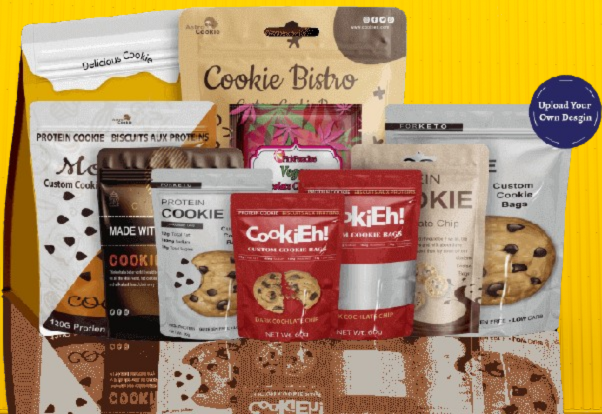In the world of baked goods, presentation is just as crucial as taste. Whether it’s a homemade batch of chocolate chip cookies or artisanal delicacies from a local bakery. The right packaging can elevate the entire experience for both the baker and the consumer. This product, with their versatility, convenience, and aesthetic appeal, play a pivotal role in preserving freshness. They enhancing presentation, and facilitating portability. In this article, we delve into the multifaceted world of Cookie Bags, exploring their diverse applications, design considerations, and sustainability trends.
The Versatility of Cookie Bags
They all are come in various shapes, sizes, and materials, offering versatility to suit different types of cookies and consumer preferences. From transparent cellophane bags that showcase the cookies inside to opaque paper bags adorned with vibrant prints, there’s a cookie bag for every occasion and aesthetic.
Preservation of Freshness
One of the primary functions of it is to preserve the freshness and quality of the cookies. Resealable options, such as zip-lock bags or adhesive closures, help maintain freshness by preventing air and moisture from entering the bag. Additionally, barrier materials with enhanced moisture resistance can protect cookies from becoming stale or soggy, ensuring they taste just as delicious as when they were first baked.
Presentation and Branding
They serve as a canvas for branding and visual storytelling, allowing bakeries and home bakers alike to showcase their creativity and craftsmanship. Custom-printed bags with logos, graphics, or product descriptions not only enhance the presentation of the cookies but also reinforce brand identity and leave a lasting impression on consumers.
Convenience and Portability
Whether it’s a grab-and-go snack for busy commuters or a party favor for a special occasion, cookie bags offer convenience and portability. Individual or portion-controlled they make it easy for consumers to enjoy their favorite Cookie Bags on the move, while larger bags cater to sharing and gifting occasions. Lightweight and compact, these are perfect for packing lunches, picnics, or travel snacks.
Design Considerations
Material Selection:
Cookie bags can be made from various materials, including paper, plastic, or biodegradable films. Factors such as moisture resistance, transparency, and eco-friendliness should be considered when choosing the appropriate material for the intended use.
Closure Mechanisms:
The type of closure mechanism whether it’s a fold-over flap, adhesive strip, or zip-lock seal affects the convenience and reusability of the cookie bag. Easy-open features and tamper-evident seals provide added functionality and security.
Size and Shape:
Cookie bags come in a range of sizes and shapes to accommodate different quantities and types of cookies. Considerations such as cookie size, stackability, and ease of handling should inform the choice of bag dimensions.
Sustainability Trends
In response to growing environmental concerns, there’s a growing demand for eco-friendly cookie bag options. Biodegradable materials, recyclable plastics, and compostable films offer sustainable alternatives to traditional Cookie Bags packaging materials. They reducing the environmental impact of cookie packaging waste. Additionally, minimalist designs, reduced packaging, and labeling with eco-friendly certifications. They communicate a commitment to sustainability and resonate with environmentally conscious consumers.
Customization Options
Printing Techniques:
Cookie bags offer ample opportunities for customization through various printing techniques. Digital printing, flexography, or offset printing can be used to apply intricate designs, vibrant colors, and high-resolution images onto the bags, allowing bakeries to create eye-catching packaging that reflects their brand identity.
Personalization:
Personalized cookie bags, featuring custom text, names, or messages, add a personal touch to gifts, party favors, or corporate giveaways. By incorporating individualized elements, bakeries can create memorable experiences for recipients and strengthen customer relationships.
Specialty Features
Window Inserts:
Cookie bags with clear window inserts provide a sneak peek of the delicious treats inside. The enticing customers with a tantalizing view of the cookies. These windowed bags are particularly popular for showcasing decorated or visually appealing cookies. Such as frosted sugar cookies or intricately decorated shortbread.
Gusseted Bottoms:
This product with gusseted bottoms expand to accommodate bulkier or irregularly shaped cookies, ensuring a snug fit and preventing Cookie Bags from getting crushed or damaged during transportation. This feature is especially useful for packaging larger cookies, such as gourmet cookies or filled cookies with generous fillings.
Interactive Elements
QR Codes and NFC Tags:
Integrating QR codes or Near Field Communication (NFC) tags into cookie packaging. They enables bakeries to connect with consumers in a digital realm. By scanning the code or tapping the tag with a smartphone, customers can access. Additional product information, recipe ideas, or exclusive promotions, enhancing engagement and fostering brand loyalty.
Seasonal and Holiday Themes
Themed Packaging:
During festive seasons and holidays, they can be adorned with themed designs, colors, and motifs to complement the occasion. From Halloween-themed bags with spooky illustrations to Christmas-themed bags featuring festive symbols like snowflakes or reindeer, themed packaging adds a touch of seasonal cheer and encourages impulse purchases.
Collaborations and Limited Editions
a. Collaborative Partnerships: Collaborating with local artists, influencers, or charitable organizations can result in unique cookie bag designs that resonate with consumers and support worthy causes. Limited edition collaborations generate excitement and drive sales, as customers eagerly collect exclusive packaging designs or support their favorite artists.
13. Global Trends and Cultural Influences
a. Regional Preferences: Cookie packaging trends vary across different regions and cultures, influenced by local traditions, tastes, and preferences. For example, in Asian markets, individually wrapped cookies in ornate packaging are popular as gifts for special occasions or festivals, reflecting cultural values of generosity and hospitality.
14. Packaging Trends in E-commerce
a. Shipping-Friendly Designs: With the rise of e-commerce, cookie bags designed for shipping should prioritize durability, crush resistance, and tamper-evident features to ensure that cookies arrive at their destination intact and fresh. Packaging solutions that minimize breakage and maintain product quality during transit are essential for a positive customer experience.
By incorporating these customization options, specialty features, interactive elements, and cultural influences into cookie bag design and marketing strategies, bakeries can create compelling packaging solutions that resonate with consumers, drive sales, and strengthen brand loyalty.
Conclusion
They are more than just a means of packaging; they’re an integral part of the cookie experience, enhancing presentation, preservation, and portability. From preserving freshness to showcasing brand identity, they play a crucial role in delighting consumers and elevating the enjoyment of their favorite treats. With a focus on Custom Packaging Solutions versatility, convenience, and sustainability, bags continue to evolve to meet the changing needs and preferences of consumers and bakers alike. Whether it’s a simple paper bag or a custom-printed masterpiece, the right cookie bag adds the perfect finishing touch to any batch of delicious cookies.



